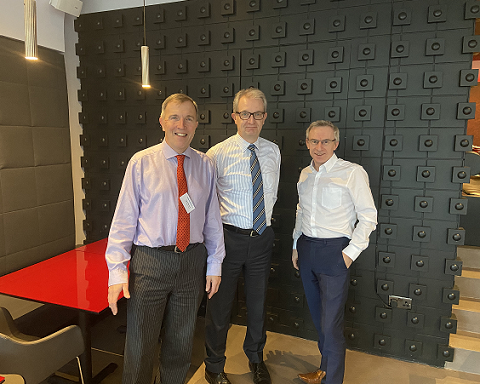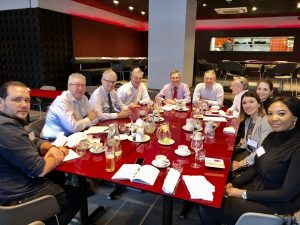Roundtable: East Midlands 2020 Vision

Articulating a clear set of demands to central government, finding ways to attract and retain talent, changing perceptions of the region and the imperative to forge longer-lasting relationships – that was the roadmap for future business success sketched out at TheBusinessDesk.com’s exclusive 2020 Vision roundtable event on Thursday (16 January).

Photo courtesy of Nicolle Ndiweni (Marketing NG/ Invest in Nottingham)
An expert panel consisting of Willmott Dixon’s Jerry Major, Roger Merchant of UHY Hacker Young and David Williams of Geldards and D2N2 LEP joined a select group of professionals at the Park Plaza in Nottingham to discuss the peculiar challenges facing businesses in the East Midlands as we enter the 2020s.
Williams and Merchant both pinpointed staff retention and the difficulty of attracting talent to the region as the biggest problems facing the legal and accountancy sectors, while Major felt that establishing longer-lasting relationships along the supply chain would be the key to success in the construction industry. He also cited the need to “change perceptions of the building site” in order to appeal to a wider set of candidates.
The panel agreed with Invest in Nottingham’s Nicolle Ndiweni that there was a pressing need to “sell the quality of life in Nottingham” to young professionals who might otherwise be drawn to London or other bigger cities, and Merchant added that a similar appeal should be made to investors, whose perceptions of the area might change if they could be made to “see what lies beneath the surface.”
Williams felt that the lack of Grade A office space in the region was another big stumbling block, citing the “lack of high spec offices in Derby and Nottingham” as a critical issue, while Merchant added that the same applied to Leicester. He said that while Leicester City FC “might be third in the Premier League, the city is something like 35th in the Grade A office table.”
In terms of government investment, all agreed that the East Midlands is the poor relation of the Midlands Engine, with the region “absolutely missing out” (Merchant) compared to other parts of the country. To bring about change, the panellists said, the region needs to speak up more clearly and co-ordinate its message to central government more effectively.
Williams said: “The two Andy’s in Birmingham and Manchester (Street and Burnham) have already given Number 10 a list of demands. We don’t have a mayor in Derby or Nottingham who has the kind of executive authority do that. The bottom line is the region needs to get its demands to government together.
“This could be a time of real opportunity if we can get our act together quickly – ideally before the Chancellor delivers his Budget.”
Major added that the region could do a much better job of co-ordinating its efforts. He said: “I think ‘stronger together’ is the answer. I don’t feel the region is pulling together as much as it should, and we are losing out as a result.”
Moving on to discuss HS2 and the state of infrastructure investment in the region, there were minor disagreements over the cost of the scheme, with Merchant describing it as a “vanity project.”
He said that as an accountant it seemed “hard to justify the cost,” and questioned whether the money might not have been better spent in smaller chunks.
However, Williams and Major both insisted that HS2 would eventually come to the East Midlands in some form and said that the development works were already having a positive effect on the East Midlands in terms of jobs.
Williams argued that the scale of the investment made sense from a long-term perspective, and that the region should “think Victorian” if it is to reap the benefits of major infrastructural projects in the future.
Wrapping up a lively discussion, the panel revealed their business resolutions for the coming year.
Williams said: “Our resolution at Geldards is to get fit. We want to cut down on inefficiencies by better use of IT.”
Merchant said that at UHY Hacker Young the plan was “to work smarter not harder,” and reiterated the importance of retaining staff, while Major said that Willmott Dixon would “continue to invest in people, build stronger relationships and continue to focus on diversity in the workplace.”
Pictured (L-R):
Ben Rawson – BRIC Consulting
Mark Burton – Tarkett Ltd
David Williams – Geldards/D2N2 LEP
Nick Heath – Willmott Dixon
Roger Merchant – UHY Hacker Young/ICAEW
Martin Burnett – Cherry Professional
Jerry Major – Willmott Dixon
Katie Delve – Butler + Willow
Alison Snee – Curtins
Nicolle Ndiweni – Marketing NG/Invest in Nottingham









